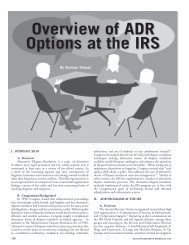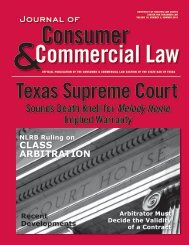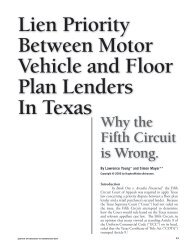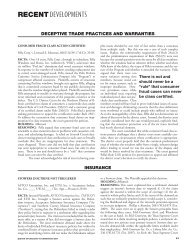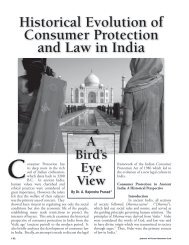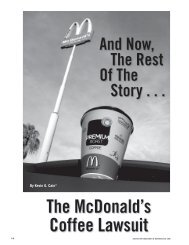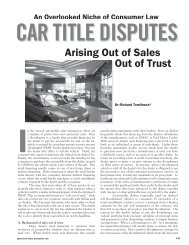Teaching Consumer Credit Law in an Evolving Australian Economy
Teaching Consumer Credit Law in an Evolving Australian Economy
Teaching Consumer Credit Law in an Evolving Australian Economy
You also want an ePaper? Increase the reach of your titles
YUMPU automatically turns print PDFs into web optimized ePapers that Google loves.
RECENT DEVELOPMENTS<br />
that account to <strong>an</strong>other party, which it did. The check, however,<br />
was fraudulent <strong>an</strong>d Defend<strong>an</strong>t refused the pay the check, <strong>in</strong>stead<br />
return<strong>in</strong>g it to Citizens. Citizens subsequently sued Pla<strong>in</strong>tiff <strong>in</strong><br />
J<strong>an</strong>uary 2009 for the miss<strong>in</strong>g funds it had wired, <strong>an</strong>d recovered<br />
most of the withdrawal amount.<br />
In October 2010, Pla<strong>in</strong>tiff sued Defend<strong>an</strong>t Citib<strong>an</strong>k,<br />
claim<strong>in</strong>g it violated federal b<strong>an</strong>k<strong>in</strong>g regulation 12 C.F.R.<br />
§229.33, <strong>an</strong>d that Defend<strong>an</strong>t breached a duty owed under the<br />
regulation. Defend<strong>an</strong>t moved to dismiss argu<strong>in</strong>g that Pla<strong>in</strong>tiff’s<br />
claims were time-barred <strong>an</strong>d preempted by federal law.<br />
The district court gr<strong>an</strong>ted Defend<strong>an</strong>t’s motion to dismiss.<br />
Pla<strong>in</strong>tiff appealed, argu<strong>in</strong>g that the limitations period should<br />
be equitably tolled, <strong>an</strong>d that its UCC negligence claim survived<br />
Defend<strong>an</strong>t’s arguments.<br />
HOLDING: Affirmed.<br />
REASONING: The court first addressed whether the Pla<strong>in</strong>tiff’s<br />
claims were barred by the statute of limitations <strong>an</strong>d determ<strong>in</strong>ed<br />
they were. Equitable toll<strong>in</strong>g of the statute of limitations applies<br />
only when the Pla<strong>in</strong>tiff shows it could not have discovered<br />
<strong>in</strong>formation essential to its claim earlier, even with the exercise<br />
of due diligence. The court held that Pla<strong>in</strong>tiff’s claims would<br />
be time-barred even if they were tolled because Pla<strong>in</strong>tiff should<br />
have discovered that it could sue Defend<strong>an</strong>t after be<strong>in</strong>g sued by<br />
Citizens <strong>in</strong> J<strong>an</strong>uary 2009.<br />
The court further held that Pla<strong>in</strong>tiff’s state law claims were<br />
preempted by federal law. The federal statutory authority for<br />
the b<strong>an</strong>k<strong>in</strong>g regulation cited by Pla<strong>in</strong>tiff expressly preempted<br />
conflict<strong>in</strong>g state laws <strong>an</strong>d state law claims. 12 U.S.C. §4007(b).<br />
The court found that the Pla<strong>in</strong>tiff was attempt<strong>in</strong>g to bypass the<br />
one year limitations period of the federal law by creat<strong>in</strong>g state<br />
law claims with three <strong>an</strong>d five-year limitations periods based<br />
on the purported federal b<strong>an</strong>k<strong>in</strong>g regulation claim. The court<br />
held that the trial court did not abuse its discretion <strong>in</strong> decl<strong>in</strong><strong>in</strong>g<br />
to f<strong>in</strong>d that Pla<strong>in</strong>tiff’s claims were equitably tolled <strong>an</strong>d were<br />
expressly preempted by federal law.<br />
TEXAS SUPREME COURT DISCUSSES STANDING<br />
AND MOOTNESS IN CLASS ACTIONS<br />
Heckm<strong>an</strong> v. Williamson Cnty, ___ S.W.3d ___(Tex. 2012).<br />
FACTS: Pla<strong>in</strong>tiffs Heckm<strong>an</strong>, Maisenbacher, Peterson, Stempko,<br />
<strong>an</strong>d Newberry faced misdeme<strong>an</strong>or charges <strong>in</strong> Williamson<br />
County. Each Pla<strong>in</strong>tiff claimed to be unable to afford legal<br />
representation, <strong>an</strong>d that they had been, or soon would be, denied<br />
their right to court appo<strong>in</strong>ted counsel. Pla<strong>in</strong>tiffs filed a lawsuit<br />
aga<strong>in</strong>st Defend<strong>an</strong>t Williamson County <strong>an</strong>d local judges, under<br />
section 1983 of the Civil Rights Act of 1871, claim<strong>in</strong>g that the<br />
public officials had deprived them of their constitutional rights<br />
which <strong>in</strong>volved right to counsel <strong>an</strong>d self-representation. They<br />
sought <strong>in</strong>junctive <strong>an</strong>d declaratory relief to stop Defend<strong>an</strong>ts’<br />
alleged unconstitutional practices. The claims were brought as a<br />
class action lawsuit for similarly <strong>in</strong>jured <strong>in</strong>dividuals.<br />
Defend<strong>an</strong>ts argued that Pla<strong>in</strong>tiffs all lacked st<strong>an</strong>d<strong>in</strong>g on all<br />
the claims <strong>an</strong>d the suit had become moot s<strong>in</strong>ce they all had been<br />
appo<strong>in</strong>ted counsel. The trial court did not rule on Pla<strong>in</strong>tiffs’<br />
petition for class-certification; however, the court of appeals<br />
held that none of the named pla<strong>in</strong>tiffs ever had st<strong>an</strong>d<strong>in</strong>g on all<br />
the purported claims <strong>an</strong>d the case had become moot. Pla<strong>in</strong>tiffs<br />
appealed.<br />
HOLDING: Reversed <strong>an</strong>d rem<strong>an</strong>ded.<br />
REASONING: The court first decided whether a named pla<strong>in</strong>tiff<br />
must have st<strong>an</strong>d<strong>in</strong>g on all of the class’s claims, <strong>in</strong> order to<br />
pursue <strong>an</strong>y of the claims. It stated that st<strong>an</strong>d<strong>in</strong>g requirements<br />
extend to class actions, <strong>an</strong>d that the <strong>in</strong>dividual who brought<br />
the class action must prove that he <strong>in</strong>dividually had st<strong>an</strong>d<strong>in</strong>g to<br />
sue. However, that same pla<strong>in</strong>tiff does not need to have st<strong>an</strong>d<strong>in</strong>g<br />
for every purported claim. The court held that the appellate<br />
court erred <strong>in</strong> dismiss<strong>in</strong>g<br />
the suit on st<strong>an</strong>d<strong>in</strong>g grounds<br />
because the named pla<strong>in</strong>tiff<br />
had st<strong>an</strong>d<strong>in</strong>g to at least one<br />
claim.<br />
The court then addressed<br />
the second issue <strong>in</strong><br />
which Defend<strong>an</strong>ts argued<br />
that Pla<strong>in</strong>tiffs’ <strong>in</strong>dividual<br />
The <strong>in</strong>dividual who<br />
brought the class<br />
action must prove<br />
that he <strong>in</strong>dividually<br />
had st<strong>an</strong>d<strong>in</strong>g to sue.<br />
claims became moot once they were appo<strong>in</strong>ted counsel <strong>an</strong>d their<br />
crim<strong>in</strong>al cases ended. Defend<strong>an</strong>ts argued that none of the mootness<br />
exceptions would apply <strong>in</strong> the present case. The court disagreed<br />
<strong>an</strong>d held that, though the Pla<strong>in</strong>tiffs’ <strong>in</strong>terest may be moot,<br />
the present case <strong>in</strong>volved claims that are <strong>in</strong>herently tr<strong>an</strong>sitory<br />
<strong>an</strong>d may apply the relation-back exception, which saves the entire<br />
lawsuit from be<strong>in</strong>g moot. The court then set two requirements to<br />
qualify for <strong>in</strong>herently tr<strong>an</strong>sitory claims. First, the claim must be<br />
one of short duration. Second, there must likely be a cont<strong>in</strong>u<strong>in</strong>g<br />
class of persons suffer<strong>in</strong>g from the same alleged harm.<br />
TEXAS SUPREME COURT DISCUSSES CALCULATION<br />
UNDER LODESTAR METHOD<br />
El Apple I, Ltd. v. Olivas, ___S.W.3d___(Tex. 2012).<br />
FACTS: Myriam Olivas filed suit aga<strong>in</strong>st her employer El<br />
Apple I, Ltd. for sex discrim<strong>in</strong>ation <strong>an</strong>d retaliation under the<br />
Texas Commission on Hum<strong>an</strong> Rights Act (TCHRA). Olivas<br />
prevailed on only the retaliation claim. The jury awarded Olivas<br />
compensatory damages of $1,700 for back pay <strong>an</strong>d $103,000 for<br />
past <strong>an</strong>d future compensatory pay.<br />
As the prevail<strong>in</strong>g party, Olivas filed <strong>an</strong> application<br />
for attorney’s fees under TCHRA. The trial court used the<br />
lodestar method <strong>an</strong>d determ<strong>in</strong>ed that the lead counsel should<br />
be compensated at a rate of $250 per hour for 700 hours <strong>an</strong>d<br />
the other attorney $300 per hour for 190 hours. The court then<br />
enh<strong>an</strong>ced the lodestar by apply<strong>in</strong>g a 2.0 multiplier, result<strong>in</strong>g <strong>in</strong><br />
$464,000 for attorney’s fees. Legal assist<strong>an</strong>t fees for 100 hours<br />
at a rate of $65 per hour <strong>an</strong>d $99,000 <strong>in</strong> conditional attorney’s<br />
fees for defend<strong>in</strong>g post-judgment motions <strong>an</strong>d appeals were also<br />
added.<br />
El Apple appealed, argu<strong>in</strong>g that the court abused its<br />
discretion because there was neither sufficient evidence to make<br />
a reasonable assessment of attorney’s fees, nor a basis to enh<strong>an</strong>ce<br />
the lodestar with a multiplier. The appellate court affirmed the<br />
attorney’s fee award. El Apple appealed to the Texas Supreme<br />
Court.<br />
HOLDING: Reversed <strong>an</strong>d rem<strong>an</strong>ded.<br />
REASONING: The determ<strong>in</strong>ation of attorney’s fees <strong>in</strong> a suit<br />
brought under state law is usually governed by state procedural<br />
54 Journal of <strong>Consumer</strong> & Commercial <strong>Law</strong>



